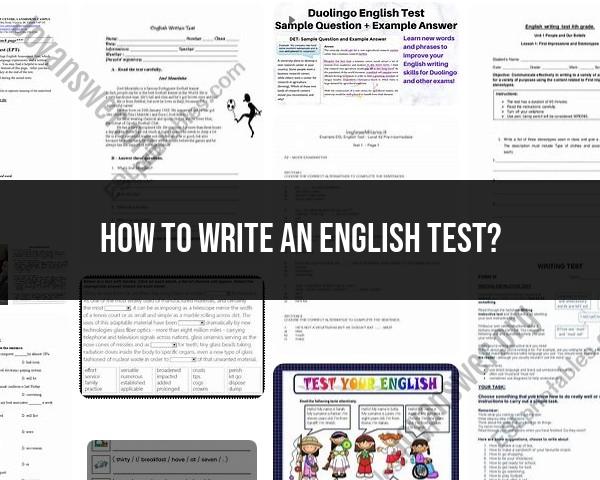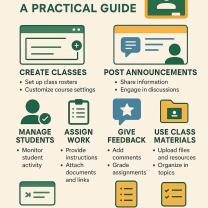How to write an English Test?
Designing an effective English test requires careful consideration of the test's purpose, target audience, and the skills you want to assess. Whether you are creating a test for language learners, students, or job applicants, here's a step-by-step guide to help you write an English test:
Step 1: Define the Purpose and Objectives
Clearly outline the purpose of the test and the specific language skills you aim to assess. Consider whether you want to evaluate reading, writing, listening, or speaking skills, and whether the test is for placement, proficiency, or specific language competencies.
Step 2: Identify the Target Audience
Understand the proficiency level and age group of the individuals taking the test. Tailor the test content and format to suit the needs and abilities of your target audience.
Step 3: Create Test Sections
Divide the test into sections based on the skills you are evaluating (e.g., reading, writing, listening, speaking). Each section should have a clear focus and contribute to the overall assessment.
Step 4: Develop Clear Instructions
Provide clear and concise instructions for each section. Ensure that test-takers understand the format, time constraints, and expectations for each task.
Step 5: Choose Appropriate Test Items
Select test items that align with the language skills being assessed. Examples include multiple-choice questions, short answer responses, essays, listening comprehension exercises, and oral presentations.
Step 6: Ensure Content Validity
Ensure that the test content accurately measures the language skills you intend to assess. Avoid biased or culturally insensitive material and strive for content validity.
Step 7: Establish a Time Limit
Set reasonable time limits for each section to ensure that the test is manageable within the allocated timeframe. Consider the complexity of tasks and adjust time allowances accordingly.
Step 8: Pilot Test
Conduct a pilot test with a small group of individuals to identify any issues with the test format, instructions, or content. Use feedback to make necessary revisions before administering the official test.
Step 9: Consider Accessibility
Ensure that the test is accessible to individuals with diverse backgrounds and abilities. Consider providing accommodations for individuals with special needs.
Step 10: Score the Test
Establish a clear and consistent scoring rubric for each section. Train scorers if necessary, and conduct a scoring review to maintain reliability.
Step 11: Provide Feedback
If applicable, offer feedback to test-takers to help them understand their strengths and areas for improvement. Constructive feedback enhances the educational value of the test.
Step 12: Review and Revise
Regularly review test results and gather feedback from test-takers and instructors. Revise the test as needed to improve its effectiveness over time.
By following these steps, you can create an English test that effectively assesses language proficiency while providing a fair and reliable measure of individuals' abilities.
Conquering the English Test: Essential Strategies and Tips
Taking an English test can be daunting, but with the right preparation, you can confidently take it on and achieve your desired score. Here's a guide to maximize your success:
1. Effective Preparation:
- Understand the test format: Familiarize yourself with the specific test you're taking (TOEFL, IELTS, etc.). Research its structure, scoring system, and time constraints.
- Assess your strengths and weaknesses: Take practice tests or diagnostic assessments to identify areas requiring improvement. Focus on honing weaker skills while maintaining your strengths.
- Develop a personalized study plan: Allocate dedicated time for studying, prioritizing challenging areas. Set realistic goals and track your progress to stay motivated.
- Immerse yourself in English: Surround yourself with the language. Read books and articles, watch movies and TV shows, listen to music and podcasts, and engage in conversations with native speakers.
2. Recommended Strategies and Resources:
- Grammar and vocabulary building: Utilize reliable textbooks, online exercises, and grammar apps to solidify your understanding. Flashcards, mnemonic devices, and word association techniques can be helpful.
- Reading comprehension: Practice reading diverse texts (news articles, essays, literature) and actively engage with them. Highlight key points, take notes, and answer comprehension questions.
- Writing practice: Regularly write essays, articles, and emails on various topics. Focus on clarity, organization, and proper grammar. Seek feedback from teachers or tutors.
- Listening comprehension: Listen to different accents and speeds, focusing on capturing key information and identifying main ideas. Practice summarizing what you hear and taking notes.
- Speaking practice: Find opportunities to converse in English with native speakers or language partners. Participate in mock interviews or discussions to enhance fluency and confidence.
3. Focus on Specific Sections and Skills:
- Listening and reading: Pay close attention to vocabulary, grammar, and sentence structure. Learn to identify main ideas, supporting details, and inferences.
- Writing: Develop strong arguments, logical organization, and proper sentence structure. Proofread and edit your work carefully.
- Speaking: Practice clear pronunciation, good grammar, and appropriate vocabulary. Work on fluency, coherence, and responding to prompts effectively.
4. Practice Tests and Simulations:
- Taking practice tests under timed conditions simulates the actual test experience and helps manage anxiety.
- Analyze your practice test results to identify areas needing improvement and adjust your study plan accordingly.
- Mock interviews or speaking simulations provide valuable practice for the spoken portions of the test.
5. Building Confidence and Proficiency:
- Set realistic goals and celebrate achievements: This fosters positivity and motivation to keep progressing.
- Surround yourself with supportive people: Seek encouragement from friends, family, or educators.
- Believe in yourself: Remember, success takes time and effort. Stay positive and persistent in your learning journey.
Remember, effective preparation is key to conquering your English test. Implement these strategies, utilize recommended resources, and focus on building your confidence and proficiency to achieve your desired score. Good luck!













